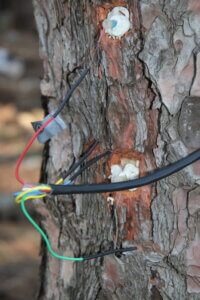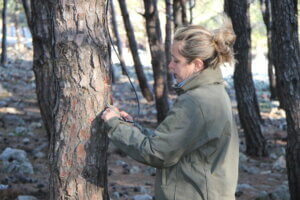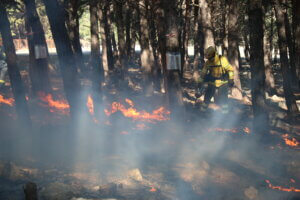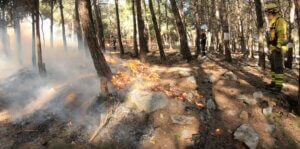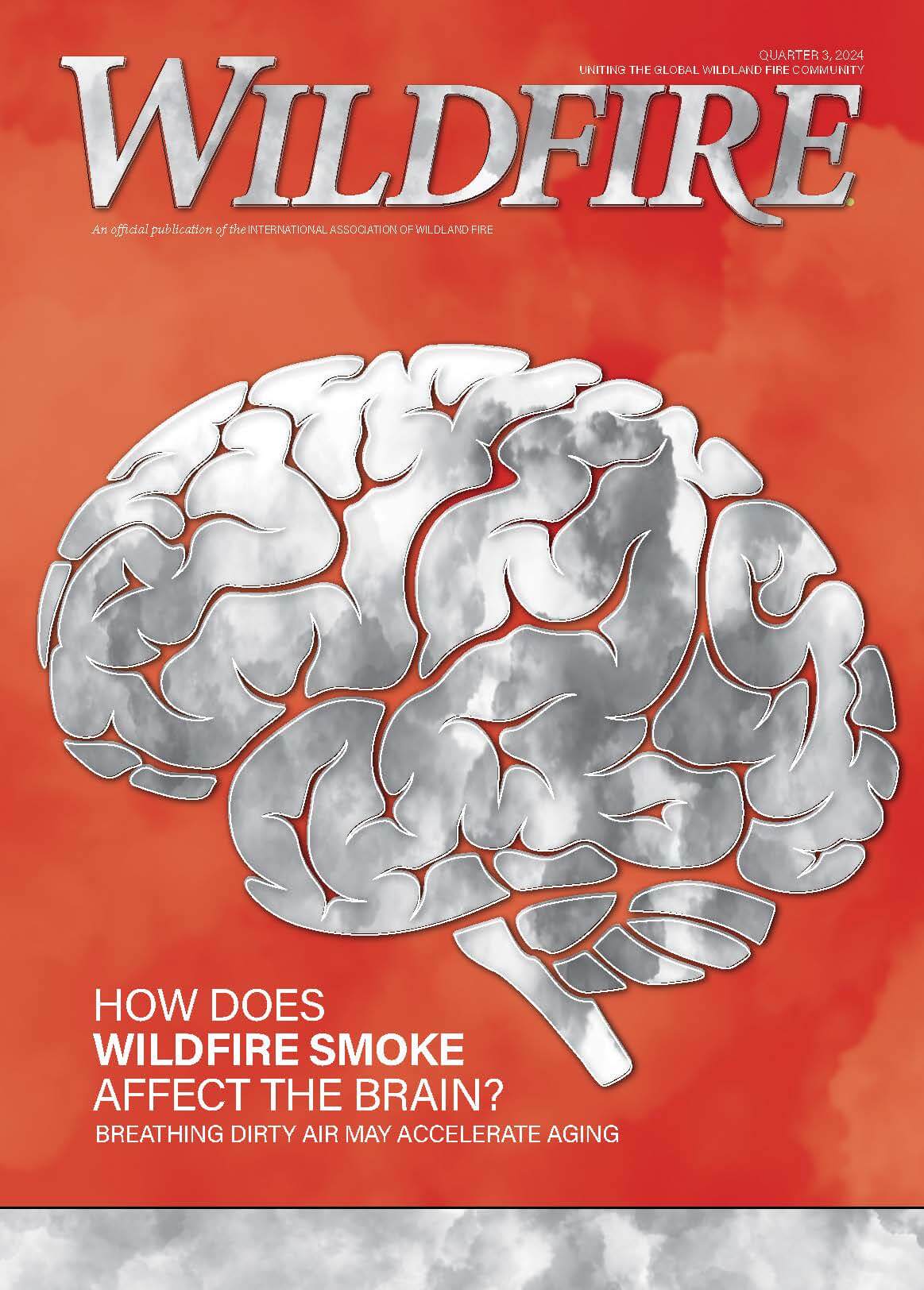GREECE
PILOT PROJECT AIMS TO CHANGE POLICY
BY MILTIADIS ATHANASIOU, TRIANTAFYLLOS BOUCHOUNAS, EVANGELIA KORAKAKI, ELIAS TZIRITIS, STAMATIA SITARA, AND GAVRIIL XANTHOPOULOS
The first efforts to introduce and utilize prescribed burning in Greece began in the 1970s, when members of the forest scientific community and the forest service applied prescribed burning experimentally. Although researchers made some steps to document the use of fire and study its impacts before introducing prescribed burning as a tool to prevent forest fires, those sporadic attempts did not tie bonds with the forest and fire management community, and the endeavour was soon abandoned mainly due to lack of constant funding, legal support, logistics, continuous scientific guidance and clear objectives.
The first efforts to introduce and utilize prescribed burning in Greece began in the 1970s, when members of the forest scientific community and the forest service applied prescribed burning experimentally. Although researchers made some steps to document the use of fire and study its impacts before introducing prescribed burning as a tool to prevent forest fires, those sporadic attempts did not tie bonds with the forest and fire management community, and the endeavour was soon abandoned mainly due to lack of constant funding, legal support, logistics, continuous scientific guidance and clear objectives.
Since 2021, we have run a two-year pilot project on prescribed burning on the island of Chios, aiming to introduce prescribed burning as a tool for forest fuels management.
Our team consists of researchers and practitioners from WWF Greece, the Institute of Mediterranean Forest Ecosystems (IMFE), the Hellenic Agricultural Organization (ELGO)-DIMITRA of ELGO DIMITRA, the Forest Directorate of Chios Island, and the Voluntary Action Team OMIKRON, and we are conducting planned field prescribed burning experiments, matching fire behaviour with the fire impact on soil properties, the effects on trees, and the plant biodiversity. A series of parameters is monitored, measured, and recorded before, during and after the implementation of prescribed burning. Fire Service of Chios Island and Municipality of Chios support the pilot project by supplying water trucks and personnel during the burns. The project is sponsored by Procter & Gamble. The General Directorate for Forests and Forest Environment of Ministry of Environment and Energy have provided all necessary permits for the implementation of pilot application of prescribed burning in Chios.
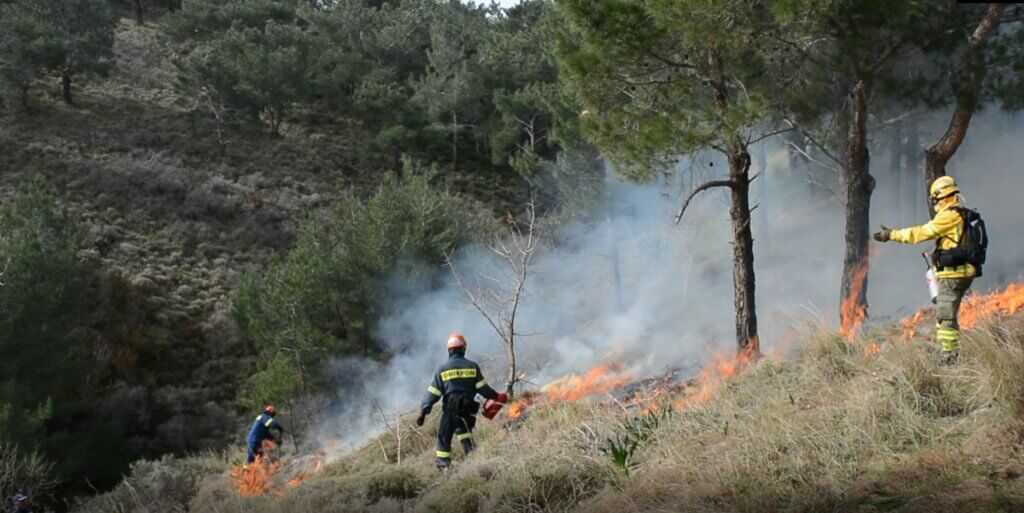
Prescribed burning is both science and technique and its successful implementation is not only science but art, as well; it can be a very accurate and effective fuels management tool, increasing social-ecological resilience to wildfire and contributing to a climateresilient future. Prescribed burning improves fire resilience over a particular landscape, reduces the probability of fire ignition, affects fire behaviour, making fire fighting easier and safer, mitigates fire severity and reduces fire damages.
Our pilot project is expected to be the starting point for the application of prescribed burning in Greece. It will a) contribute, through applied research, to the standards and procedures development for the use of prescribed fire in Greece, b) strengthen the role of the forest service in fuel management, c) build the capacity of the volunteer firefighters’ teams on issues related to wildfire prevention and fuel management, d) increase knowledge and improve experience on fire behaviour, fostering actionable science, e) further strengthen, improve and expand local alliances and f) improve landscape resilience and prevent forest fires.
Through our effort we expect, in the long run, prescribed burning to be institutionalized in Greece, and assimilated by competent services and local communities, as a tool for fuels management and consequently forest fire prevention through documented policy and law proposals that will be based on the results of this pilot implementation.
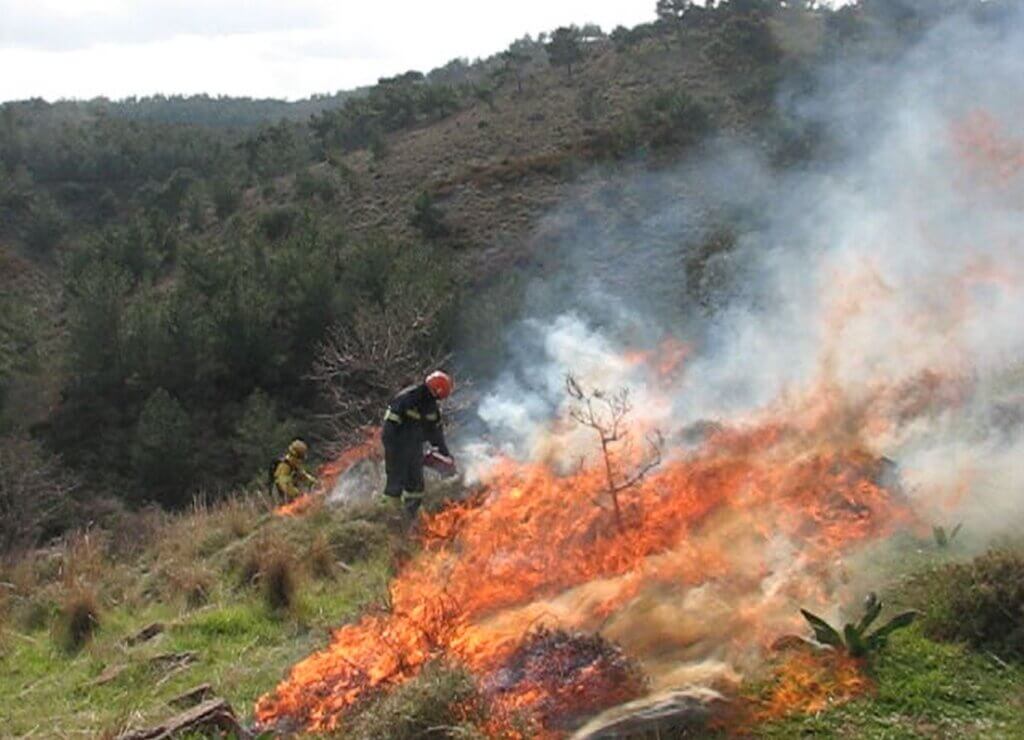
ABOUT THE AUTHORS
Miltiadis Athanasiou holds a B.Sc. degree in environmental science from the University of the Aegean, Lesvos, Greece, a M.Sc in prevention and management of natural disasters from the National and Kapodistrian University of Athens and a PhD in wildland fire science from the same university. He has been a volunteer firefighter for 23 years and has worked in aerial firefighting, as crew member of heavy-lift helicopters in Greece. He has also worked as research affiliate with the Institute of Mediterranean Forest Ecosystems in Athens, Greece. His work includes documentation of wildfire behaviour in the field and analysis, fuel modelling, fire risk assessment and prediction, and past firefighting accidents’ reconstruction. He trains firefighters on wildfire behaviour, hazards, firefighting tactics, human factors, safety and health on the fire line, and he tries to promote the use of fire in fire prevention in Greece, which for the time is not legally recognized.
Triantafyllos Bouchounas holds an Intergraded M.Sc (B.Sc. plus M.Sc.) in forestry and natural environment from the Aristotle University of Thessaloniki, Greece, and a M.Sc. in planning and development of natural resources and forest informatics from the same university. He has also attended classes of the post graduate program Prevention and Management of Natural Disasters in National and Kapodistrian University of Athens, Greece and has been a volunteer firefighter for 16 years. He has worked for ESRI Greece/Cyprus) in Geographical Information Systems software support and consulting for four years, in the Greek National Cadastre & Mapping Agency of the Forest Maps & Natural Environment Directorate for two years and he is working as project manager in national and international programs.
Dr Evangelia Korakaki is a researcher in the Laboratory of Tree Physiology of the Institute of Mediterranean Forest Ecosystems (IMFE) of ELGO DIMITRA. She received her master’s degree and her PhD (2003, 2008) from University of Edinburgh in Tree Physiological Ecology. Her main interests are in studying forest responses to biotic and abiotic factors and environmental changes, emphasizing in drought effects in a climate change context and exploring the mechanisms of adaptation and evolution of forest ecosystems. In the past, she has worked at WWF – Greece as the Head of the Forest Department for 10 years (2008-2018), in the Institute of Forest Research and IMFE (ELGO DIMITRA) and in the Forest Directorate of Athens. She has been involved in several projects aiming at improving fire prevention policies and practices, as well as post- fire rehabilitation in Greece. Currently, she is involved in a pilot project on the island of Chios, on introducing prescribed burning in wildfire management in Greece.
Elias Tziritis works as co-ordinator of wildfire prevention at the Conservation Department, WWF Greece. He holds a B.Sc. in political science from the Panteion University of Social and Political Sciences, Athens, Greece, and a M.Sc. in environmental policy and management from the University of the Aegean, Lesvos, Greece. Since 2004, he has been the liaison of WWF Greece policy team on wildfires, and he organizes wildfire prevention awareness campaigns. He has been a volunteer firefighter for 24 years.
Stamatia Sitara holds a diploma in agricultural science from the Agricultural University of Athens, and she is a volunteer firefighter, member of Chios Volunteer Team “Omikron.” She is participating in the prescribed burning pilot project on Chios island, supporting fuel moisture content measurements.
Gavriil Xanthopoulos is an associate researcher specializing in forest fires at the Institute of Mediterranean Forest Ecosystems of the Hellenic Agricultural Organization “Demeter.” He holds a B.Sc. in forestry from the Aristotelian University of Thessaloniki, Greece, and an M.Sc. and PhD in forestry with specialization in forest fires from the University of Montana. He has been active in European forest fire research for more than 30 years, with a parallel involvement in many aspects of operational fire management, post-graduate teaching and forest fire management training. He has served as member of the board of directors of the International Association of Wildland Fire (2005-2010 and 2017-2022) and as an associate editor for the International Journal of Wildland Fire. His research interests include forest fire policy, fire prevention, fire danger rating, fire behavior, fuel management, firefighting, post-fire rehabilitation, forest fires and climate change, and new technologies in fire management. His publications cover a broad spectrum and reflect his involvement with both research and operational applications.
